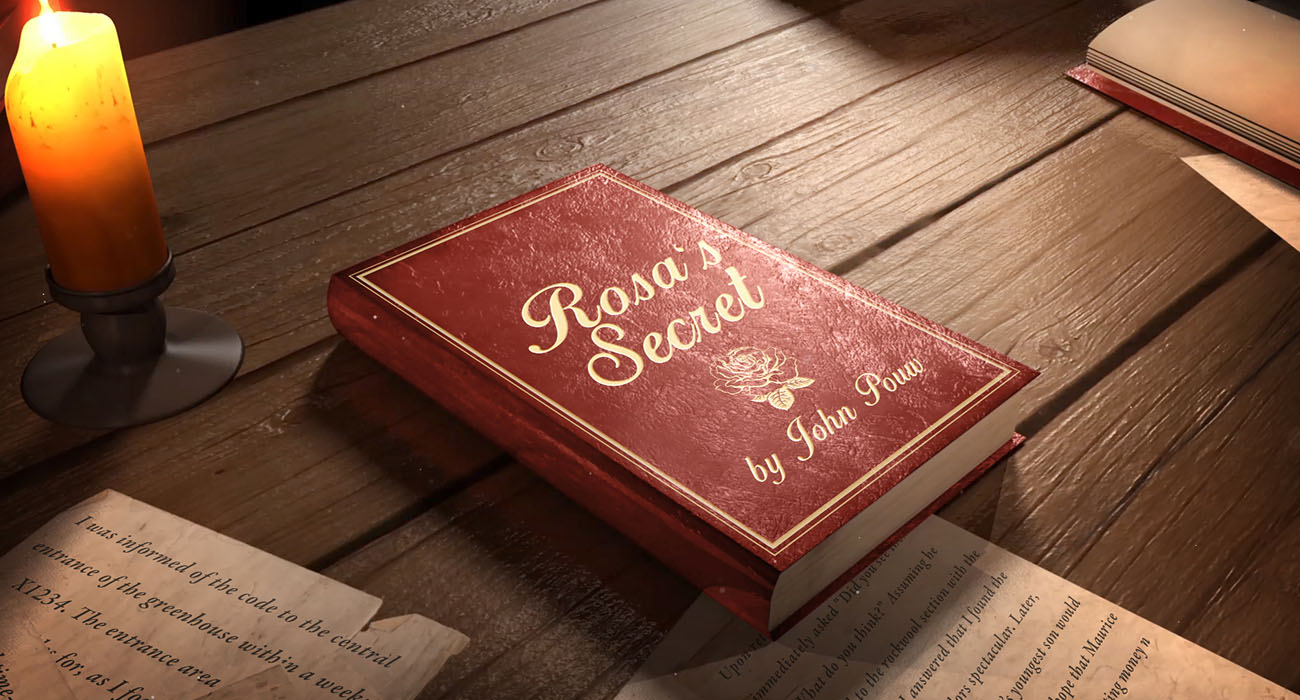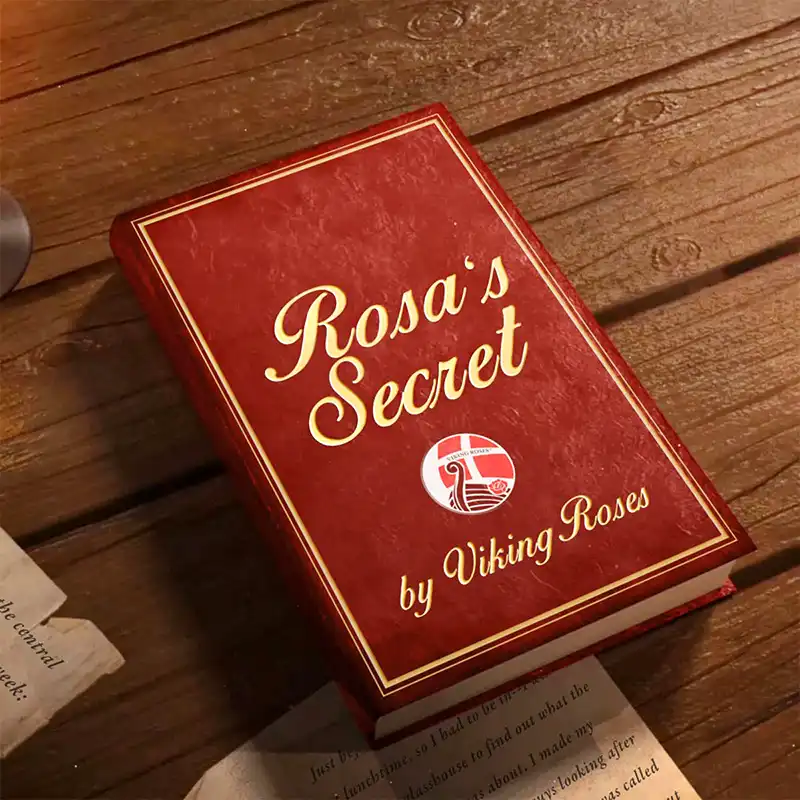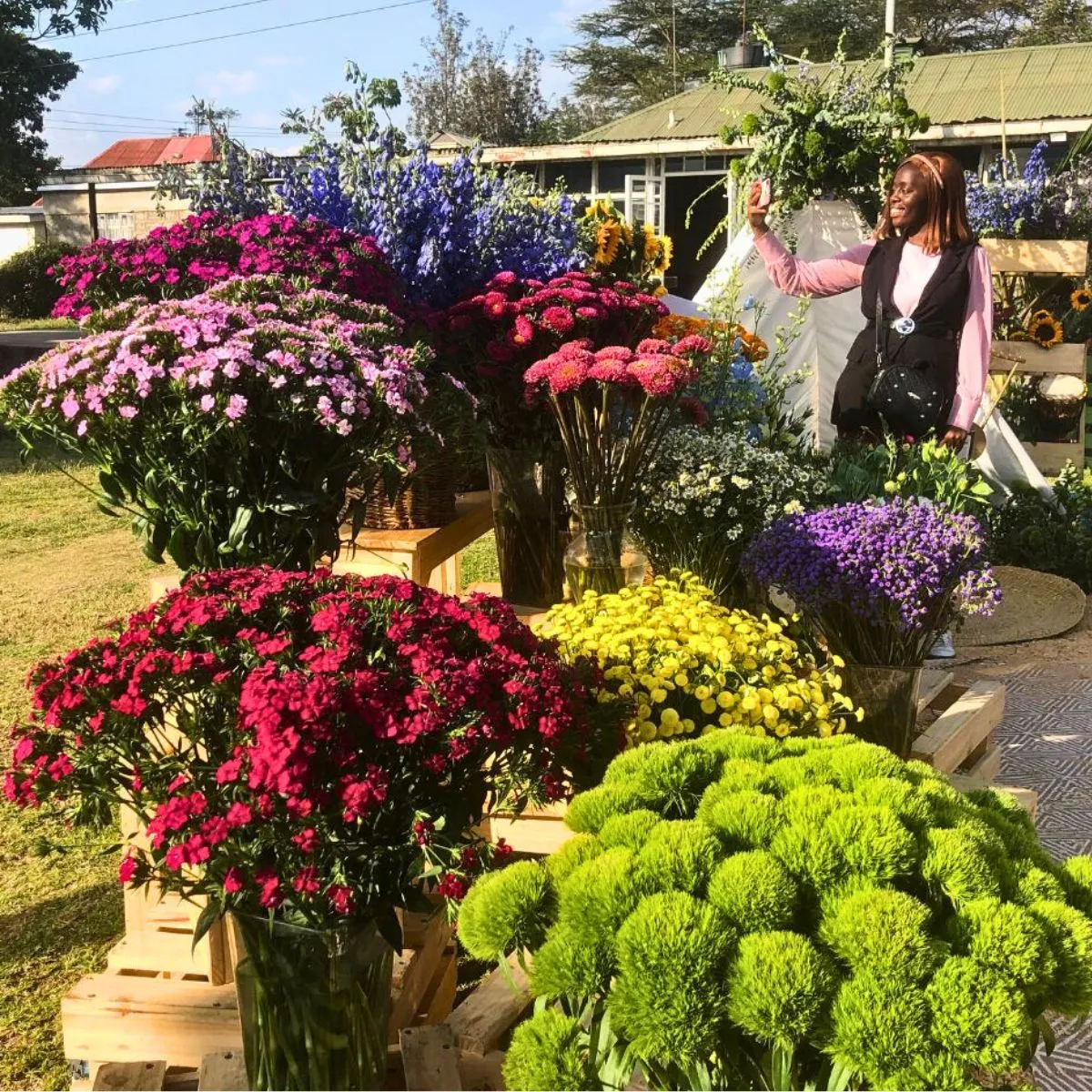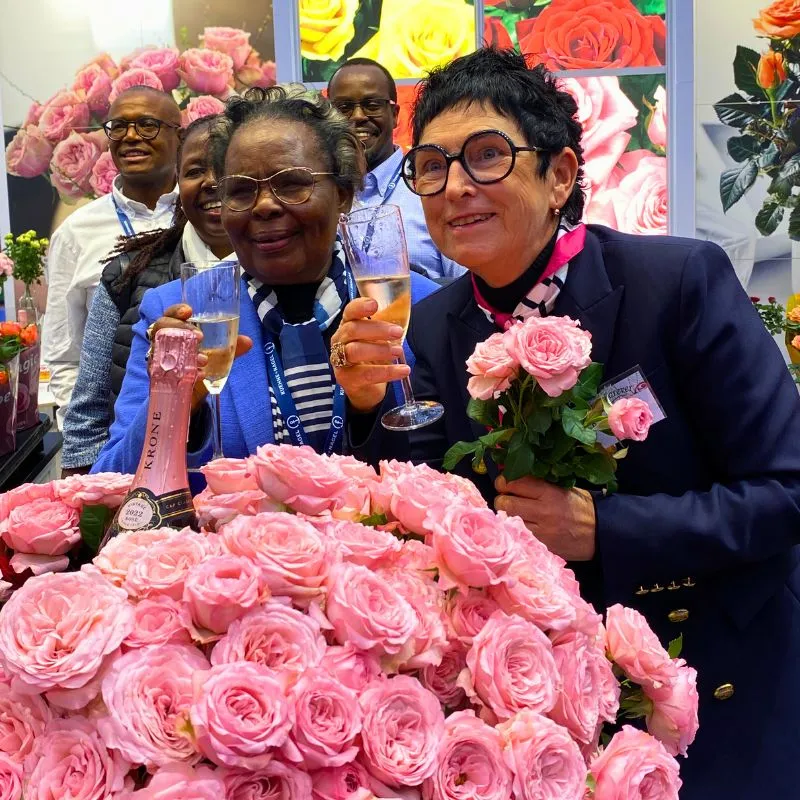At lunchtime, Snuf comes in. “Do you know where I spotted Maurice’s car? At the little car park along the N207, just outside Bleiswijk. Do you think …” “That could be, Snuf, he has gone out for lunch and maybe that’s where he eats his sandwiches,” I reacted.
“But that’s a gay meeting place!”
Puzzled. I knew the parking area, in a little wooded area, but had no idea of its secondary function. Maurice? Why not? But then, he was always the first to laugh about the typical sexist jokes of the industry and had enjoyed the spectacle at Hooters during our U.S. trip.
“How was your meeting with the Groeneveld brothers, Snuf?”
Snuf had been very busy organizing the propagation of the LAVAL code LA-17452, a bicolor that we would introduce as Aura®, two hectares, to be planted exclusively by two growers, the Tulp brothers and the Groenevelds, also three brothers. After other growers had found out the plans of the Tulps, many others had announced their wish to follow, but had to be politely denied. Since the variety was hot and Snuf didn’t want the risk of plants ‘disappearing’ from propagators’ facilities, we had decided to propagate inhouse, that is, on tables with the Pot Rose Division. Then it appeared that Big Anton had given 20,000 plants to his friend Hein Dirkzwager, the Groenevelds had found out and had summoned Snuf. Dirkzwager was one of Anton’s big-friends-group: sharing appetites for food, beer, partying, and cars. Recently, at the afterparty of the De Kwakel beer-and-manure-fair, they shared complaints about their Mercedes dealer and had decided to change to American cars. A week later, five of them, Verseman couldn’t join, visited the Lincoln dealer in Utrecht and bought six new vehicles, including one for Verseman.
Snuf’s homosexual escapade theory quickly turned into a panic. “Dirkzwager himself had told Han Tulp that he was planting Aura® and Han then called Leen Groeneveld. They are furious and will sue us.” He instantly left to check with the Pot Rose Division.
I was busy getting organized for a short trip to Israel and about to welcome Rosalie. With business rapidly expanding at home and abroad, Jan Rust was hired two weeks earlier for domestic sales combined with Africa. The idea was, that our cultivation specialists would work on the home market, and each have their ‘own’ continent. Snuf for South America, Jan for Africa and Kees Ent to join in a month and look after Germany. Jan had a background in substrates, particularly cocopeat, and as such knew all Dutch rose growers. Kees would come over from propagator Bontekoe after having multiplied and sold rose plants for 20 years. Jan and Kees would be in Benthuizen every Monday for a sales meeting in the small board room with Snuf and Maurice. Sjef would be present most of the time. I would attend if I was in the country. Jan and Kees formally reported to Snuf for Dutch prospects and sales, contacts with the auctions and would primarily work out of the office of the Pot Rose Division in Nieuwveen, close to Aalsmeer and location of our showcase.
Though other breeders would not have salesmen operating internationally, I thought it was important to make optimal use of their experience, but also be aware of what was happening on other continents and share this with their Dutch clients. With the flower industry becoming more and more international, we would also service our Dutch growers this way.
Norma was also hired after finishing her internship, relation with her elderly French beau still intact, taking care of the daily international communication and joining me regularly on trips. I found it important to have a backup.
After the retirements of Dré and Piet, Maurice was appointed as director, but soon realized that I was more suited for the job, on the condition that he could attend formal events, to which I wholeheartedly agreed. As the Financial Director there was more than enough work on a totally different scale, from cash payments for rosebushes from visiting consumers to international transfers from Guernsey, Ecuador, or Panama. After discovering unsent invoices for plantings in Kenya, we had subtly asked our accountant Teun to the rescue and be Maurice’s mentor.
Rosalie arrived for her first working day. I had never met her, and she had never visited Witte de Wit, officially that is. Sjef had been concerned with our breeding secrets. Seedy never wrote down anything, leaving this to Junior, who had scribbled down all breeding information in small booklets, using pencil and eraser. The oldest booklets, with all the crossings of Father Dré and their results in terms of numbers of seeds, seedlings, dominant genes, and more were hardly readable anymore. Now that the breeding office also had a computer, it was time to organize and preserve. Seedy and Junior hated office work, so it was agreed to hire somebody to lay down the data, organize the vase life trials, and store these results and, on top of this, support in the pollination in the summer. To make the search for a perfect candidate even more complicated, should this be a young female, she should be able to resist lady-killer Peli.
Actually, Rosalie was instantly thought of by Junior. She was the eldest daughter of his sister Sien, who always assisted with the pollination. Another Witte de Wit, though carrying her father’s last name, Hassefras, who didn’t name his daughter to honor her grandfather’s mission, but after a song of his favorite band Thin Lizzy. Yes, also the granddaughter of our cleaning lady. Rosalie turned out to be a very calm and organized 17-year-old, straight out of school. Diploma, but no ambition for future studies. She had already spoken to Seedy and, informally, with ‘Uncle Harry’ and couldn’t wait to get started. Julia didn’t see her as a threat to her position and, knowing I was preparing another trip, generously offered to take Rosalie around to introduce her to the greenhouse staff, who undoubtedly already knew of her arrival.
I wasn’t looking forward to the 3-hour boarding time for the flight to Tel Aviv. The meeting had been the initiative of Iko Chaim Litzman. Giv’at Mahore had been the agent for Paul Schmidt for the LAVAL varieties in Israel, South America, and Africa. Though Iko argued that although the outcome of the ownership lawsuit was still unclear, he still considered himself the official agent of LAVAL under new ownership.
The big success of Premier Rouge® in Holland and its sudden introduction in South America by Witte de Wit had caused much confusion, Iko argued, especially after the recent show in Harare, where Witte de Wit and Giv’at Mahore both displayed the variety.
The direct reason for Iko’s invitation for a meeting with the parties concerned, Crispi, Witte de Wit and Giv’at Mahore, however, must have been the letter all African growers received from Crispi. Two weeks before, I had been with Agostino Crispi in his house in Latte Ventimiglia on Sunday when he confessed that the next day he had to go to his bank and it would become clear that he had forged some documents and that, in fact, he would be bankrupt.
Premier Rouge® royalties were in a blocked bank account in Holland, Giv’at Mahore had started selling the variety in Africa, but Iko would transfer these royalties to Schmidt.
I had wondered how Crispi managed to finance his operation with only his cut rose production, no incoming royalties and all the lawyers’ expenses. Now this became clear. We had over one million guilders awaiting payment to the legal owner. We were sure this was Crispi, but the court decision would possibly take a few more years. I had an idea and asked Crispi for some time to make a call.
“Thank God you’re home, Sjef. You know I’m with Crispi. He just confessed he will go bankrupt tomorrow. This will also make our situation with the Premier Rouge® royalties more complicated, but I’ve got an idea.” Sjef had been convinced of Crispi’s ownership from the beginning, mainly because it would be better for us. “I propose to pay the one million to Crispi first thing tomorrow morning. In exchange I will ask for the exclusive agency for Africa. Farms are planting Premier Rouge® but have not paid any royalties yet.” Sjef thought this was a great idea but was skeptical. “Do you really think Crispi goes along with this and are you sure about the African royalty payments?” I was confident. “Crispi is desperate and only wins in this arrangement and I know the payment time in Africa is one year, so no royalties have been collected yet.” Sjef would call the befriended bank manager at home instantly, so that the transfer could be made the minute the bank opened on Monday.
Crispi was in tears, and we hugged for a long time.
“We will make an appendix to our new contract, but I need you to do something in the next few days. I will draw up a letter which needs to be printed on your letter paper and signed by you. I will then fax this to all African farms. We state that you are the rightful owner of LAVAL and its varieties, among which Premier Rouge®, and they shouldn't pay any royalties until further notice.”
Iko’s lawyers had demanded that I would bring the necessary documents to prove that I was allowed to sign documents on behalf of the owners of Witte de Wit. Big Anton and I had to visit a notary public for this. Micha Meir collected me from the airport, dropped me off at the office of the Israeli lawyers and would pick me up in time again to catch my return flight late in the evening.
The last time I saw Micha was during our ‘fishing expedition’ in the desert, checking out Israeli propagators with some other breeders in the heat. I had met Bernd Solf of Von Bismarck and Hans Schultz of Rosen Vorbeck in Hamburg to inform them of the unreported plants at Gideon Dayan Nurseries. During the same meeting we decided to form IRBO. Micha had followed up on Gideon Dayan. He was very disappointed. Instead of taking Dayan to court, both Vorbeck and Von Bismarck had finally struck a deal. In Hamburg we had agreed to jointly terminate contracts of infringers and on the first opportunity this agreement was broken. On the other hand, Giv’at Mohare had been very cooperative with the Flower Bureau.
Agostino and Vincenzo had already arrived at the lawyers’ premises in Tel Aviv and were in the meeting room with Iko and his manager Amnon and two lawyers. More staff were standby in the next room, ready to instantly work out any agreement. Iko started off by making clear that any agreement made was on the assumption that Crispi owned LAVAL and should legal proceedings with Paul Schmidt prove otherwise, any present agreement was null and void and any royalties paid by Giv’at Mahore should then be returned.
African royalties for Premier Rouge® were indeed outstanding, as I anticipated. Agostino was very firm on the agency for Witte de Wit for The Netherlands, South America, and Africa. Any agreement for these countries should be concluded with Witte de Wit.
Every year at the Aalsmeer flower show in November I had a requested meeting with Iko and Amnon. They would always ask for the Witte de Wit representation for Israel, South America and Africa, or at least propagation and sales rights. For their repetitiveness, those meetings always seemed to take forever, and they always insisted on speaking to me rather than Norma.
Today, after the endless repetition of their cooperativeness, plant quality, knowledge of the respective markets, etc., and my acknowledgement of all that to avoid lengthy discussion, Iko finally stated that they would be prepared to share the agent’s part for their own sales of Premier Rouge®, depending on the arrangement for the codes that were still on trial. Giv’at appeared to have their trials with Litzman South America in Ecuador, also representing Von Bismarck here. For Africa they were selling plants out of Israel of the varieties that were doing well at the Dutch auctions, with licenses from most breeders.
As far as I recognized, the list of LAVAL codes in Ecuador contained the previous batch we went through in Benthuizen, before LA-17452 and a few others we had selected from the last batch. The Crispis were silent throughout, unaware of the international market outside Europe and depending fully on Witte de Wit’s selections for outside France and Italy.
I had informed the others at the start that I would only have three hours not to miss my return flight. After two hours the lawyers would make a draft agreement, but they were taking forever. After three hours Micha arrived to return me to Ben Gurion airport. No paperwork yet. When, twenty minutes later, I said goodbye and was about to leave, they came out. Standing, I scanned through the draft: Giva’t’s payment time was not as agreed (one year instead of 6 months), 25% share for Premier Rouge® was only for their own sales and not for all sales in the areas, the list of codes needed further study and future varieties were never discussed. For the last two groups Giva’t claimed full representation for the party that was first in selecting.
We could make some handwritten changes, they argued, but I refused. Plane to catch and too much to change. We set a new date and I rushed out with Micha, a little frustrated. The tactics were obvious. I agreed with Micha that for the next meeting I would book a later flight, not tell and Micha would come to collect me at the time of the earlier flight.
On the plane I studied the draft in more detail and was happy to have their list of codes, so we could compare with our files of LAVAL trials.
Back in the office the next day, I heard that Snuf had reported sick after having found out that indeed 20,000 plants of LA-17452 (Aura®) had been taken from the propagation at our Pot Rose Division and planted at Hein Dirkzwager. I called Big Anton and told him to reserve the afternoon to go and see the rest of the propagation and visit the Tulps and Groenevelds, then made appointments with them. They were eager to talk to us, not having heard from Snuf anymore.
“What are we going to tell the Groenevelds and Tulps?’, Anton asked when I arrived. “The truth, Anton. You had a friend in need that you wanted to help and made a mistake not to discuss with Snuf.”
“You know, I had a look in the propagation and there seemed to be enough plants. They were really looking good, so I thought we could spare some to help Hein.”
Anton was aware of his mistake. We went to see the remaining plants and estimated there would easily be 100,000, so the missing quantity would be no more than 20,000. Anton could see they were growing really well and if we would keep them one week longer, we could use a lot of young stems to propagate.
Both Groenevelds and Tulps appreciated Anton’s honesty but demanded compensation for late delivery. We agreed that priority would be to fill their empty greenhouses as soon as possible, make sure the introduction at the clocks would be perfect and then I would return to discuss damages.
Back in the car, Anton asked about the meeting in Tel Aviv and said he would personally look after the propagation to make sure every eye was used and not a plant lost.
All of the LAVAL’s codes on the Giva’t list had indeed been rejected, so I could use this in the new meeting in Tel Aviv, the week after.
According to plan, Micha dropped me off and returned at the announced time. Again, the lawyers took forever and, standing up to go, some last-minute changes I insisted on were made to the draft by hand and the famous Tel Aviv Accord was signed and toasted by all three parties with cognac in coffee cups. I rushed out to have a relaxed dinner with Micha in a small restaurant.
"L’chayim!"







